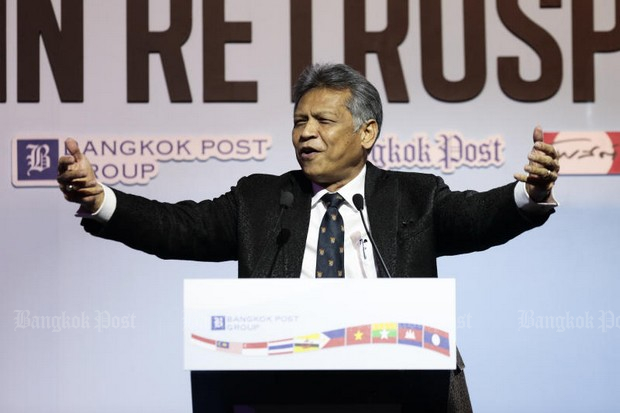
Asean should take the initiative in establishing its own regional development fund to address its lack of infrastructural development, the bloc's former secretary-general Surin Pitsuwan said Thursday.
Speaking at the "Asean@50: In Retrospect" forum, Mr Surin said the region must stop relying on aid from outside countries to solve its problems, citing visible cracks in the European Union in the form of Brexit as an example.
"We cannot expect to get the same amount of charity and generosity we have received in the past," he said. "While Japan has been generous to us, and China is arriving with its Belt and Road Initiative at present, this form of reliance has put us at the mercy of our dialogue partners."
"What we must do now is turn towards each other for dependence," he added.
He said Asean requires US$2 trillion to solve its infrastructural problems, adding Indonesia is in need of the most help.
Indonesian government initiatives report a need for $358 billion worth of investment in infrastructure to meet its targets by 2019. But central state budgets can only amount to about 41% of the funds, while its state-owned companies can provide a further 22%.
"If we want to compete for foreign investment with countries such as India and China, we must all contribute in helping each other," Mr Surin said.
He suggested Asean should set aside an initial $100 billion, to be managed by the Asian Development Bank (ADB). This would rightfully disperse the funds to nations that need it the most and promote independence for the region, he said.
However, varying levels of development among Asean member states have created an imbalance.
- Goh, Mahathir: Strong leadership is vital
- Commerce Minister Apiradi: Apiradi: Poised for trade growth
- Industry Minister Uttama: Innovation-tech synergy
- Business view: Stability 'paramount'
- Currency surge: Baht hits 30-month high
"While we have agreed to reduce tariffs for each other in the region, I have learned from experience the countries that are more advanced than others will be more reluctant to open up their markets for the rest," he said.
"Myanmar, for example, has the least amount of non-tariff barriers because it is still an emerging country."
Mr Surin said Asean has relied on foreign institutions such as the World Trade Organisation and the Singapore International Arbitration Centre to settle issues of trade.
He suggested it should develop its own trade dispute settlement system to support future trade initiatives within the region. This would also reassure investors the region can settle its own issues while remaining open for trade.
"We have been expected to pull the global economy out of crisis, but the problem is we are not measuring up to those expectations," he said.
"The region has all the information it needs, found in the Asean Charter. What we must do now is pay more attention to perfecting the platforms we have already established."
Asean is headed for further economic development, he said, citing a steady rise in the urban population.
Reports from the Singapore Institute of International Affairs state that over 500 million Asean citizens will be classified as middle class by 2030, with the working-age population in the region projected to expand by 85 million over the next 30 years.
"Asean has thus far survived 50 years of challenges, and the next 50 are going to be even more challenging," Mr Surin said.

